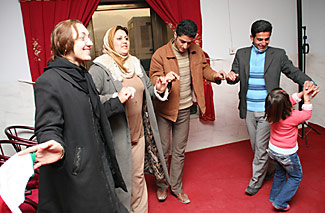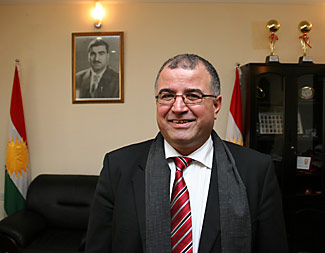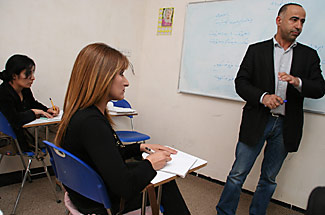
April 29, 2008 | Staff writer | By Sam Dagher
Taha Barwari came back to northern Iraqi from Sweden with a mission to inspire young Kurds disaffected by decades of war.

Choman, Iraq - Nestled amid Iraq's highest mountains between the Iranian and Turkish borders, lies a town of farmers and traders, smugglers and truckers.
Choman is a place of dramatic beauty with snowcapped peaks and lush valleys. But even though Baghdad seems like a world away, the residents here, and in many other towns in Kurdish Iraq, still struggle to overcome the impact of war.
In the 1980s, Saddam Hussein destroyed these areas to attack Kurdish rebels. Today, Iran and Turkey target separatists hiding in the mountains.
This turmoil has given rise to a generation that knows little more than war and has little hope in the new Iraq.
"It's not easy to rise from the ashes of war, sanctions, and isolation," says Taha Barwari, who returned to Iraq from Sweden with a vision: change the mind-sets of young Kurds.
"We need a creative, educated, democratic, stimulated, employed, equal, and active youth population," says Mr. Barwari, minister of sports and youth for the Kurdistan Regional Government (KRG).
Since returning to his native northern Iraq two years ago, Barwari has been leading a quiet revolution with the backing of KRG Prime Minister Nechirvan Barzani, to do nothing less than alter the outlook of young Kurds.
With the help of his like-minded assistant, Asos Shafeek, who is also a recent returnee from Sweden, the minister has established 33 recreational centers around the region especially in deprived communities.
Barwari calls the centers "factories for attitude change."
His ministry is also involved in a project to publish 60 books in the Kurdish language distilling the concepts and ideas of world thinkers. He has pushed for the creation of a special committee made up of representatives of key ministries just to deal with the needs of the youth. His ministry sponsored the first coed summer camp in 2007.
Barwari estimates that about 65 percent of Iraqi Kurdistan's population of about 4.5 million is made up of people between the ages of 14 and 30, while 75 percent of his government's budget is spent on public sector salaries.
His initiatives are primarily aimed at promoting the virtues of volunteerism, critical thinking, independence, and entrepreneurship among the young people in a society overwhelmingly bound by a near-blind allegiance to the two main ruling parties, the Kurdistan Democratic Party (KDP) and the Patriotic Union of Kurdistan (PUK).

He says that for Kurds to ever attain their true potential and fulfill their dream of statehood one day, they must first begin to change their own outlook and attitude.
"It's the beginning of something … they are leading the young to be different for the future. Not only to be political fanatics," says Handrin Hassan, an intern at the ministry visiting from Sweden, which is home to a significant Kurdish community as well as other Iraqis of all sects and ethnicities who have found refuge there over the years from their war-ravaged country.
But in his quest Barwari has faced strong criticism from some members of the old guard in his own KDP who view his ideas as being "too Western."
Nowhere is the impact of what Barwari is trying to accomplish more evident than in some of the remotest and most impoverished corners of the region, such as Choman.
In 1983-84, Mr. Hussein leveled the town in his so-called Anfal campaign against the rebelling Kurds.
"Even the walnut trees were blown up with TNT," says Abdul-Wahid Gwany, the town's mayor.
Residents started returning to Choman and rebuilding their homes in 1991 when the semiautonomous Kurdistan region was established here.

One year ago, Barwari and his aides opened a recreational center here complete with a library, a gym, a movie theater, and a radio station – all facilities that did not exist in the area. Now, three local young people are trying to keep it going on a volunteer basis, despite waning interest from residents, skepticism by local officials, and huge logistical challenges including the lack of reliable electricity supply.
"We have nothing here, so by being involved in this center, I feel like I am giving something to our community," says Suham Mirhamed, who is a nurse by training and dedicates a lot of her time to managing the center.
One of her assistants, Salar Ismail, a high school student who runs the radio station, says that if it were not for the center he and many of his friends "would just spend most of their time on the streets."
Mr. Gwany, who is also the local KDP boss, is not convinced of the value of the center when most of the area's young people come from families struggling to make ends meet in a place beset by inadequate infrastructure and basic services.
"The Kurdish youth are at a boiling point … kids do not have jobs and some can't even meet their most basic needs. Volunteerism is not possible under these circumstances," says the mayor, adding that the youth must be paid salaries in order to be involved in the center. "Barwari's idea is bad and it's coming from Europe."
Mr. Shafeek, Barwari's assistant, says that it's precisely this attitude that they are trying to battle.
"We want our youth to be empowered. We want to create a movement of young people that are strong, motivated and free," he says. "They want slaves."


